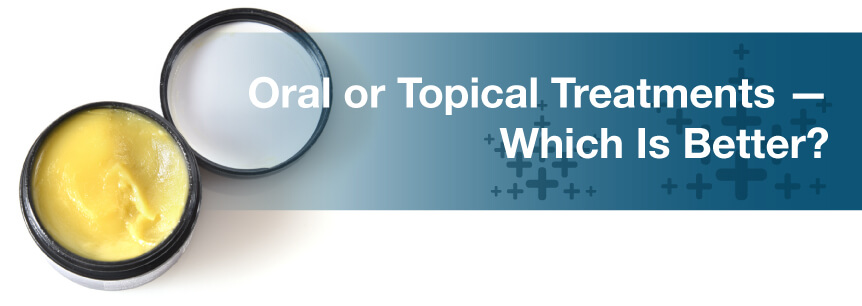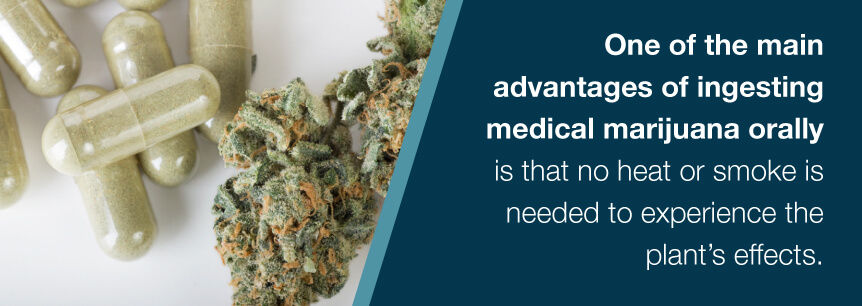
The medical marijuana industry is booming like never before. Patients have more options to choose from, and there are different varieties and strains that offer distinct effects. We also have CBD-dominant medications that allow patients to experience many of the benefits of cannabis without the high. We’ve even developed options for different ways to use medical marijuana.
With all these choices, you may feel overwhelmed. Although the most common method for consuming cannabis is smoking or vaping, these aren’t the only choices. In fact, some believe these methods are the least curative. More and more people are discovering both oral and topical treatments. However, these two methods vary quite differently from each other — but both have advantages.
Depending on your medical condition, one of these two methods may have more distinct benefits you should consider. Your doctor may also have a recommendation about which is best for you. But, experimentation will allow you to find the method that best soothes and relieves your symptoms.
Ingesting cannabis dates back thousands of years. But, with our renewed interest in marijuana as medicine, there are now several ways patients can take cannabis orally. Each is slightly different than the other, so patients should try out multiple methods to find which works best for them. Here is an overview of the three main options.
Both cannabis oil and raw medical marijuana can be baked or cooked into many different edible products. When these treatments are ingested, the essential cannabinoids are absorbed via our digestive system. They travel through the bloodstream to our brain, thus impacting our endocannabinoid system’s receptors with its benefits.
Some popular edible treatments include:
One of the most accurate ways to dose medical marijuana is with tinctures. These are produced by soaking a marijuana plant in an alcohol-based mixture for at least six weeks, which transfers the medicinal compounds to a liquid.
Tinctures are placed under the tongue using an eye dropper or a sublingual spray. The medication is then absorbed directly into the bloodstream through the mucous membranes, causing the user to feel its effects almost immediately.
Concentrated cannabis oil is placed within capsules patients can then swallow. The effects of capsules are much like those of edibles in that they pass through the digestive tract and into the bloodstream. Time release capsules are also available, which release measured doses over an extended period of time.
One of the main advantages of ingesting medical marijuana orally is that no heat or smoke is needed to experience the plant’s effects. When cannabis is smoked, harmful toxins are released that can damage users’ lungs. Ingestion has other advantages, including:

Like all forms of medicating, using cannabis orally has its drawbacks, such as its:
Oral medical marijuana can treat the same qualifying conditions patients would smoke or vape to treat. Not only do oral medications provide potent relief, but many patients also prefer the long-lasting effects. While most patients using smoking or vaporization to provide immediate relief of painful symptoms, tinctures also provide quick relief when its needed most, without the smoke.
Topical medical marijuana treatments are any type of cannabis solution applied directly to the skin. Unlike other methods of medication, topicals provide relief straight to the part of the body it’s used on, meaning it’s concentrated, not generalized.
Topicals are made by infusing oil with cannabis, which is then used as the main ingredient in topical treatments. Instead of passing into the bloodstream, these medications are applied to our body’s largest organ: the skin. Since marijuana easily dissolves into lipids and fats, it readily enters our cells’ membranes, working with endocannabinoid receptors to provide concentrated relief exactly where you need it.
Producers are coming up with many types of topical treatments, but the main products you’ll find in dispensaries include:
The main drawback of topical medical marijuana is that it’s unable to treat some of the conditions cannabis is known for managing, including glaucoma, epilepsy and nausea, among others.
However, topicals provided distinct advantages for many patients who need:
Topicals produce both analgesic and anti-inflammatory effects when applied directly to the skin. Although there is limited research on all its applications, many anecdotal reports claim topicals treatments can be used to effectively treat:
All medical marijuana decisions should be made under the supervision of your physician. Although we provide this information to help you learn the basics, your doctor’s input is invaluable when deciding between medical marijuana treatments for your specific condition and symptoms.
If you have not spoken to a marijuana doctor in your state about treatment options, make an appointment today to talk to a qualified healthcare professional.
No Information on MarijuanaDoctors.Com should be used to diagnose, treat, prevent or cure any disease or condition. You can view our Full Disclaimer here.